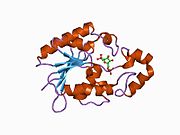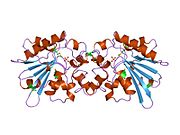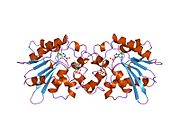Biology:PFKFB1
From HandWiki
Short description: Protein-coding gene in the species Homo sapiens
 Generic protein structure example |
6-phosphofructo-2-kinase/fructose-2,6-biphosphatase 1 is an enzyme that in humans is encoded by the PFKFB1 gene.[1][2]
This gene encodes a member of the family of bifunctional 6-phosphofructo-2-kinase:fructose-2,6-biphosphatase enzymes. The enzyme forms a homodimer that catalyzes both the synthesis and degradation of fructose-2,6-biphosphate using independent catalytic domains. Fructose-2,6-biphosphate is an activator of the glycolysis pathway and an inhibitor of the gluconeogenesis pathway. Consequently, regulating fructose-2,6-biphosphate levels through the activity of this enzyme is thought to regulate glucose homeostasis.[2]
References
- ↑ "Localization of human liver 6-phosphofructo-2-kinase/fructose-2,6-bisphosphatase (PFKFB1) within a YAC contig in Xp11.21". Genomics 40 (2): 358–61. Apr 1997. doi:10.1006/geno.1996.4530. PMID 9119406.
- ↑ 2.0 2.1 "Entrez Gene: PFKFB1 6-phosphofructo-2-kinase/fructose-2,6-biphosphatase 1". https://www.ncbi.nlm.nih.gov/sites/entrez?Db=gene&Cmd=ShowDetailView&TermToSearch=5207.
Further reading
- "Sequence of human liver 6-phosphofructo-2-kinase/fructose-2,6-bisphosphatase". Nucleic Acids Res. 18 (12): 3652. 1990. doi:10.1093/nar/18.12.3652. PMID 2163524.
- Marker AJ; Colosia AD; Tauler A et al. (1989). "Glucocorticoid regulation of hepatic 6-phosphofructo-2-kinase/fructose-2,6-bisphosphatase gene expression". J. Biol. Chem. 264 (12): 7000–4. doi:10.1016/S0021-9258(18)83531-1. PMID 2540168.
- "Molecular cloning, sequence analysis, and expression of a human liver cDNA coding for fructose-6-P,2-kinase:fructose-2,6-bisphosphatase". Biochem. Biophys. Res. Commun. 153 (1): 328–33. 1988. doi:10.1016/S0006-291X(88)81226-9. PMID 2837207.
- "Tissue-specific structure/function differentiation of the liver isoform of 6-phosphofructo-2-kinase/fructose-2,6-bisphosphatase". J. Biol. Chem. 278 (1): 523–30. 2003. doi:10.1074/jbc.M209105200. PMID 12379646.
- Strausberg RL; Feingold EA; Grouse LH et al. (2003). "Generation and initial analysis of more than 15,000 full-length human and mouse cDNA sequences". Proc. Natl. Acad. Sci. U.S.A. 99 (26): 16899–903. doi:10.1073/pnas.242603899. PMID 12477932. Bibcode: 2002PNAS...9916899M.
- Gerhard DS; Wagner L; Feingold EA et al. (2004). "The Status, Quality, and Expansion of the NIH Full-Length cDNA Project: The Mammalian Gene Collection (MGC)". Genome Res. 14 (10B): 2121–7. doi:10.1101/gr.2596504. PMID 15489334.
- Ross MT; Grafham DV; Coffey AJ et al. (2005). "The DNA sequence of the human X chromosome". Nature 434 (7031): 325–37. doi:10.1038/nature03440. PMID 15772651. Bibcode: 2005Natur.434..325R.
- Kimura K; Wakamatsu A; Suzuki Y et al. (2006). "Diversification of transcriptional modulation: Large-scale identification and characterization of putative alternative promoters of human genes". Genome Res. 16 (1): 55–65. doi:10.1101/gr.4039406. PMID 16344560.
{{Navbox
| name = Glycolysis enzymes | title = Metabolism: carbohydrate metabolism: [[Biology:Glycoglycolysis/gluconeogenesis enzymes | state = autocollapse | listclass = hlist
| group1 = Glycolysis
| list1 =
| |
| group2 = Gluconeogenesis only| list2 =
| to oxaloacetate: | |
|---|---|
| from lactate (Cori cycle): | |
| from alanine (Alanine cycle): | |
| from glycerol: |








